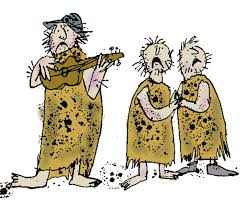The warm weather was turning Jenny’s small square patio into an idyllic sun trap. She had everything she needed within arms’ reach; the small picnic table held a choice of reading material, a bottle of water, cool from the fridge, sunglasses and her trusty Walkman. She leaned back in the deckchair, put her earphones in and began to re-read a favourite Dickens novel to the dulcet sounds of Neil Young. A strange mix perhaps, but one that suited her mood.
She’d been out on the patio for less than an hour when it started. A loud and very unpleasant rendering of ‘You Ain’t Nothing But a Hound Dog‘. It was coming from a garden to the rear of hers and what the singer lost in tone and accuracy, they made up for in ear-splitting noise.
Turning off the Walkman and putting down her book, she got up and risked a look up the garden to the source of the noise. The most brief of glances was sufficient to confirm that the music was not about to stop.
They had been warned about potentially troublesome neighbours by the rather snobbish estate agent when they bought the house back in November. Their end-of-terrace house was ex-council stock and extremely solid. Most of their neighbours had lived in the area since the houses were built after World War II, and had taken up the option to buy their homes when it was offered. Jenny had been born on a council estate however, and based on her own experiences, didn’t foresee any issues with this.
It had been cold when they moved into their new house.
Quiet and cold.
They had apologised to their close neighbours for the noise made when the central heating was put in but the occupants of the house joined to theirs were out at work all day, and the neighbour on the other side had the width of two garden paths between him and the noise of the drilling, added to which he was out on his scooter visiting family for most of the day as well.
Christmas was warm and cosy once the heating was in. Their first proper home together.
When Spring came Jenny and her husband-to-be spent some time in the garden trying to shift the pile of builders’ rubble left outside the back door so that they would actually have a paved area to sit on. They dug out a pathway up the steeply sloping garden and laid paving stones in order to have a stable surface on which to walk when hanging out the washing.
The garden wasn’t large but it was enclosed by larch lap fence panels and once the rubble was removed, grass began to emerge and a couple of patches of daffodils planted by a previous owner. Jenny bought a batch of twigs that were supposed to grow into roses eventually. She planted them with optimism.
House and garden were put on hold at the end of April as they made preparations for their May wedding. Nearly everything went to plan, and the things that didn’t quite work out were manageable. Who knew that their honeymoon room in a New Forest hotel would have a radiator that wouldn’t turn off, or that the wedding taking place in the grounds would be so noisy that they couldn’t have the windows open? They were moved out of the romantic room with the four-poster bed and relocated to a quiet and more substantial suite at the back of the hotel.
It was quiet and cold.
It was good to be away and exploring new territories on their honeymoon, but equally wonderful to come home to their little house and the growing garden. Good to return as a married couple with life ahead of them. Jenny was looking forward to the warmer weather and being able to sit out in their garden.
Reluctantly she brought her relaxing-in-the-garden equipment indoors as the Elvis impersonators at the top of the garden completely drowned out her own music and made it impossible to read. Jenny’s husband was at work and the only way to escape from the noise was to shut herself in the front room with the kitchen door and windows shut, and the TV on loud.
She dug out her husband’s binoculars and, hiding behind the new curtains in the back bedroom, she identified the source of the noise. The occupants of the house that backed onto a house three doors down from theirs were having a karaoke party. The hideous racket was being created by a group of only four people; three males and a female. From the number of empty – and full – beer cans observed, the party was set to go on all day. The karaoke machine was set up on a huge TV plugged into an extension lead hanging out of a downstairs window. The garden was reminiscent of a rag and bone yard; piles of rusting metal objects, a shopping trolley with only three wheels, damp cardboard boxes sagging in heaps, and three ancient kitchen chairs around the kitchen door step.
The lone female was perched precariously on a stool that looked as if it had been pilfered from a pub; she was wearing a very small pair of shorts made from cut-off jeans, and a white boob tube that had lost its elasticity, neither of which did much to cover her extremely pale and substantial body. Two of the males appeared to be of a similar age to her, whilst the other seemed to be of a younger generation. They all sported tattoos but Jenny’s husband’s binoculars were not strong enough to see whether the spelling was correct or not.
Curiosity made her careless and as the curtain dropped back, the female in the garden caught sight of Jenny and let fly a stream of obscenities that completely drowned out the karaoke machine. Jenny left the bedroom quickly, her heart beating double-time, and retreated to the safety of the front room after making sure that all the doors were locked and the kitchen blinds were down.
This was how her husband found her some hours later when he came home; curled up on the sofa under a blanket, curtains drawn and TV tuned to a loud and particularly appalling cable channel.
Jenny cried when she told him about the nasty neighbours and they both hoped that the incident was a one-off.
It wasn’t.
As soon as Jenny settled to read and relax on the patio, the noise would start. Weekends or weekdays, it made no difference. Other neighbours asked the family to turn the noise down and were met with the customary obscene gestures and insults. The female would get very excited and pull down her boob tube, exposing a pair of pallid and pendulous breasts to anyone unfortunate enough to be looking.
In order to regain some privacy if not peace, Jenny’s husband and a couple of friends laid some paving stones at top end of the garden and erected a garden shed which effectively blocked the view of the patio from the noisy neighbours, who screamed abuse throughout but were unable to prevent progress.
That was when the warfare started in earnest.
First of all their car boot was broken into in the night. The offenders didn’t steal much and the insurance covered the damage and what was taken but it was another blot on the landscape of their first home together.
Then someone set fire to the front garden gate – in the middle of the night again. The fire was soon put out but the attendance of the fire brigade and the police escalated the incident to a new level. Jenny had no proof of who was behind the fire but the fact that the noisy neighbours were spotted grinning and jeering in the crowd watching the fire engine, was a possible clue.
The son of the family tried to set the garden shed alight but was caught in the act and went off for a spell of juvenile detention.
The loss of her only son inflamed the female even further; their house was next door to the local convenience store and she took to watching from her front room window and pouncing like some malevolent trapdoor spider on anyone that she felt might have reported her son to the police.
Jenny and her husband stuck to the safety of supermarket shopping.
The end of summer was welcomed as a respite from the karaoke parties and nocturnal nastiness, but the return of the prodigal son caused an unwitting end to the hostilities anyway. The police kept him under surveillance once he came home and within a very short time the house was successfully raided for drugs and stolen goods.
The neighbourhood had been under the impression that the horrendous family had bought the house years before and that was why they behaved in such a proprietorial way. Not so. They were council tenants and the housing department were gleeful at having finally found a solid reason to evict them.
Some of the neighbours came out to watch on the day of the eviction; arms folded and grim smiles as the bailiffs changed the locks and two of the older males were arrested for assaulting a female police officer. This was before the age of ASBOs but the evicted tenants were left under no illusions about what might happen – legally or illegally – if they returned to the property.
When the summer came round again, being able to sit out in the garden was something Jenny had looked forward to but the damage had been done and she never felt that she could relax there again.
It was a relief when they had to move North for her husband’s work.
The little house was rented to a young couple with a child who treated it with a complete lack of care and respect. When their tenancy came to an end, the house was put on the market and managed by the most inept bunch of estate agents going.
Miles away, in a rented house herself, Jenny received a phone call to say that the house had been broken into. The estate agent had left the back door keys in the kitchen drawer and as a consequence the burglars had been able remove the fridge freezer and the washing machine – both of which had been wedding presents just a few years before. They tried to remove the boiler too but failed and the estate agent had to foot the repair bill.
Jenny and her husband sold the house eventually and after a few trips South to visit family, they stopped feeling the need to drive past their old home.





